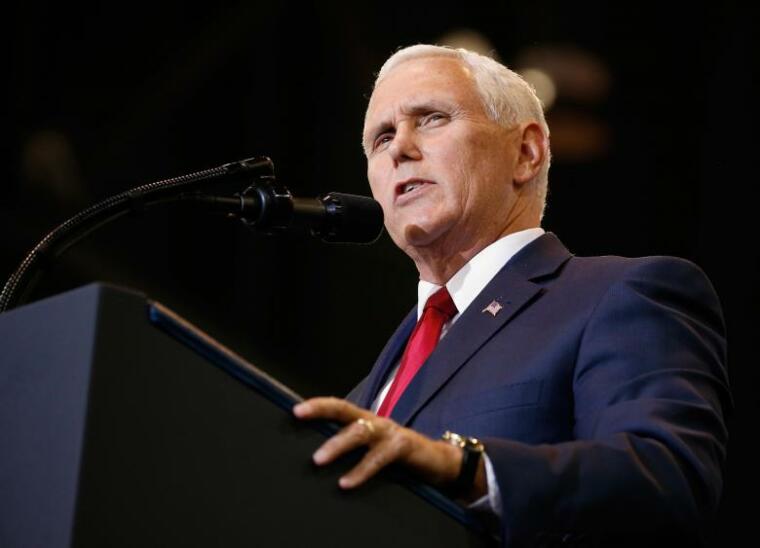Mike Pence announces plan to aid Middle East Christians directly instead of relying on UN

U.S. Vice President Mike Pence has announced plans to provide direct aid to persecuted Christians in the Middle East instead of relying on the United Nations.
"Our fellow Christians and all who are persecuted in the Middle East should not have to rely on multinational institutions when America can help them directly," Pence told the crowd gathered in Washington, DC, for the annual summit of In Defense of Christians (IDC).
"And tonight, it is my privilege to announce that President Trump has ordered the State Department to stop funding ineffective relief efforts at the United Nations. And from this day forward, America will provide support directly to persecuted communities through [the United States Aid Agency]," the vice president added.
The vice president noted that the government will be sending aid directly through USAID and faith-based partners.
The announcement comes as human rights organizations have called on the Trump administration to change a policy that required the government to funnel all aid funding for Iraq through the U.N. Displaced Christians and other minority groups in the region have not reportedly received much help to rebuild their communities even though the U.S. government had already provided more than $1 billion in humanitarian aid and hundreds of millions in reconstruction aid.
In his speech, Pence castigated the U.N. for its failure to help the "most vulnerable communities" and leaving "countless people [to] continue to suffer and struggle needlessly."
"Here is the sad reality. The United Nations claims that more than 160 projects are in Christian areas. But for a third of those projects, there are no Christians to help," the vice president said, as reported by The Christian Post.
He went on to note that less than two percent of Christians in Nineveh had received help over their housing needs and the majority of Christians and Yazidis remain in shelters.
He then claimed that the U.N. often denies funding requests made by faith-based groups that have proven track records in the region.
Pence's announcement was hailed by religious groups such as the Knights of Columbus and Open Doors USA, which are both actively involved in the rebuilding efforts in Iraq.
The vice president had not provided further details on which organizations or projects, in particular, the government will be partnering with.
Pence also announced his plans to visit Israel and Egypt in December. He vowed to deliver a message to leaders in the Middle East that "now is the time to bring an end to the persecution of Christians and all religious minorities."
He also assured that the Trump administration is calling the Islamic State's acts against religious minorities in Iraq and Syria for what they truly are — "genocide."
Then-Secretary of State John Kerry had officially designated the atrocities committed by ISIS as genocide last year, and the current administration, including Rex Tillerson, has continued to use that designation.
Pence had also delivered a speech at the World Summit in Defense of Persecuted Christians last May.
The IDC summit was sponsored by various Christian organizations, including the Philos Project, the Institute on Religion and Democracy and the Religious Freedom Institute.
 Christians don't have to affirm transgenderism, but they can’t express that view at work: tribunal
Christians don't have to affirm transgenderism, but they can’t express that view at work: tribunal Archaeology discovery: Medieval Christian prayer beads found on Holy Island
Archaeology discovery: Medieval Christian prayer beads found on Holy Island Presbyterian Church in America votes to leave National Association of Evangelicals
Presbyterian Church in America votes to leave National Association of Evangelicals Over 50 killed in 'vile and satanic' attack at Nigerian church on Pentecost Sunday
Over 50 killed in 'vile and satanic' attack at Nigerian church on Pentecost Sunday Ukrainian Orthodox Church severs ties with Moscow over Patriarch Kirill's support for Putin's war
Ukrainian Orthodox Church severs ties with Moscow over Patriarch Kirill's support for Putin's war Islamic State kills 20 Nigerian Christians as revenge for US airstrike
Islamic State kills 20 Nigerian Christians as revenge for US airstrike Man who served 33 years in prison for murder leads inmates to Christ
Man who served 33 years in prison for murder leads inmates to Christ


 Nigerian student beaten to death, body burned over ‘blasphemous’ WhatsApp message
Nigerian student beaten to death, body burned over ‘blasphemous’ WhatsApp message 'A new low': World reacts after Hong Kong arrests 90-year-old Cardinal Joseph Zen
'A new low': World reacts after Hong Kong arrests 90-year-old Cardinal Joseph Zen Iran sentences Christian man to 10 years in prison for hosting house church worship gathering
Iran sentences Christian man to 10 years in prison for hosting house church worship gathering French Guyana: Pastor shot dead, church set on fire after meeting delegation of Evangelicals
French Guyana: Pastor shot dead, church set on fire after meeting delegation of Evangelicals ‘Talking Jesus’ report finds only 6% of UK adults identify as practicing Christians
‘Talking Jesus’ report finds only 6% of UK adults identify as practicing Christians Mission Eurasia ministry center blown up in Ukraine, hundreds of Bibles destroyed: 'God will provide'
Mission Eurasia ministry center blown up in Ukraine, hundreds of Bibles destroyed: 'God will provide' Church holds service for first time after ISIS desecrated it 8 years ago
Church holds service for first time after ISIS desecrated it 8 years ago Burger King apologizes for 'offensive campaign' using Jesus' words at the Last Supper
Burger King apologizes for 'offensive campaign' using Jesus' words at the Last Supper Uganda: Muslims abduct teacher, burn him inside mosque for praying in Christ’s name
Uganda: Muslims abduct teacher, burn him inside mosque for praying in Christ’s name